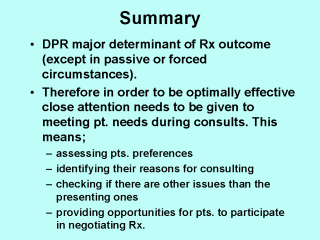| front |1 |2 |3 |4 |5 |6 |7 |8 |9 |10 |11 |review |
 |
In summary, The doctor patient-relationship can have significant impacts on Rx (treatment) outcomes, directly through discouraging the patient from returning or through doctor shopping, and indirectly, possibly by limiting the coping resources the patient perceives are available to cope with significant demands from chronic or life-threatening illness, and thereby impacting on the patientís QoL. How can a doctor optimize the DPR? By ensuring the patients needs are met, where feasible. This involves careful assessment of the patientís reasons for attending, their expectations and their current position regarding knowledge and attitudes about their condition. It is important to check with the patient if they would like to contribute towards decisions about treatment. In most minor conditions, patients will be happy to accept the doctorsí treatment recommendations, but with chronic illness, the situation develops where the patient becomes as much, if not more of an expert in his or her illness than the doctor. Under these circumstances, it is obligatory that the doctor and patient work as a partnership to tackle the patientís problems. |